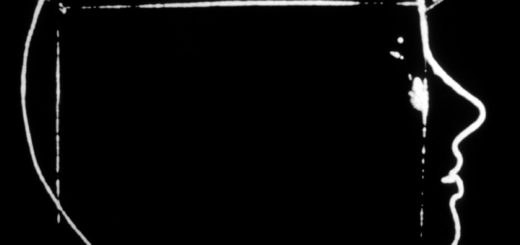Music Roundup 5/1/18
We’re here to tell you what’s hot and what’s not in this week’s music roundup

Bishop Briggs – CHURCH OF SCARS
Genre: Pop Soul
Favorite Songs: “Lyin’,” “White Flag,” “Dream,” “River,” “Water,” “Hi-Low (Hallow)”
Bishop Briggs’ long-awaited debut album is arguably worth the wait. Having played SXSW two years in a row, as well as opening for Coldplay and Kaleo, her voice has been simmering on the back burner just waiting for this glorious moment. A beautiful marriage of her UK roots and Los Angeles residence, CHURCH OF SCARS showcases her velvety vocals over dark, brooding themes, walking a crevice road that her mainstream contemporaries have left untraveled. Despite the three years that went into making it, the 30-minute album reflects a young artist who still has to earn her place in the songwriting limelight. CHURCH OF SCARS is all about her voice, leaving the instrumentals simple and, at times, underused. “Wild Horses” and “Hallowed Ground” are the least complex songs on the album but will be perfect for club remixes, with sparse, repetitive lyrics and dancy melodies. Briggs does a wonderful job of exploring and merging different genres and textures, ranging from trap-like beats to shoegaze distortion. Songs are bold and dramatic, with just the right amount of lull to contrast the punchy singing like on “Hi-Low (Hallow)” and “Dream,” which both demonstrated a balance of powerful and vulnerable. “Lyin’” is by far the most EDM-like track, with a beat that drives the song until the vocals are swooning and distorted. “Tempt My Troubles” kicks off the album with a luring drum line and vocals that build from a conversational whisper, and it features some great wordless sing-along moments with a catchy melody. Her RIAA-certified gold single, “River,” has a heavy beat with clapping and chains that complement her assertive lyrics: “Shut your mouth, baby stand and deliver.” After getting hooked on it last year and hearing amazing things about her live performances, there’s obviously a gap between the short and sweet CHURCH OF SCARS and the kick-ass powerhouse I expected from Briggs. With all the anticipation, hopefully she’ll be wowing us more soon, but until then we at least have a little something to feast on. [Liliane Neubecker]
Verdict: Recommend
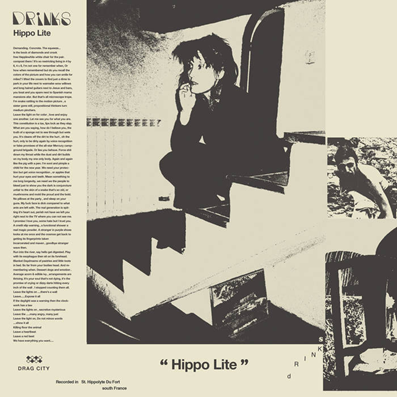
DRINKS – HIPPO LITE
Genre: Art Pop
Favorite Tracks: “Greasing Up,” “Leave the Lights On,” “You Could Be Better”
DRINKS’ 2015 debut, HERMITS ON HOLIDAY, is surrealist art rock, a 41-minute journey of standard garage fare by way of John Cale. Songs like “Tim, Do I Like That Dog?” or “She Walks So Fast” would sonically melt down, structureless in their guitar sound and lacking prudence. DRINKS made avant-garde rock that lived in the here and now, perhaps to a pretentious fault, but it was rock music. It’s hard to call their latest, HIPPO LITE, rock music, at least not in a conventional sense. On their sophomore album, the Los Angeles duo focus on acoustic stringed instruments, piano, and synthetic production elements, creating songs that remain jarringly lacking in structure, but feel softer and more playful. Even as they reach rudderless no wave status on songs like “Real Outside,” “Corner Shops,” and “Ducks,” there is an ease and a pleasantness to the repetitive guitars and formless vibing. “Ducks” in particular reads like a more experimental The Slits, reminding us that their garage rock past is still here even if the drive and intensity has calmed. Instrumentation aside, most of the album’s ease comes from providing shorter songs and more interludes, allowing ideas to become less stagnant and, frankly, less annoying. When DRINKS want to make cohesive and melodic songs, like the plucking “Greasing Up” or fiddle-driven “You Could Be Better,” they really nail it, delivering songs that are light and airy and take on a strange lullaby quality. But still attempting to create something more experimental, the anti-pop HIPPO LITE is generally unconcerned with exploring prettier orchestrations, even if it teases those ideas frequently and successfully enough that it would be better off if it did. The quieter, simpler, less driving approach works wonders for DRINKS, and even if it’s not a great album, it’s a far more interesting, cohesive, and listenable one than their debut. [CJ Simonson]
Verdict: Recommend
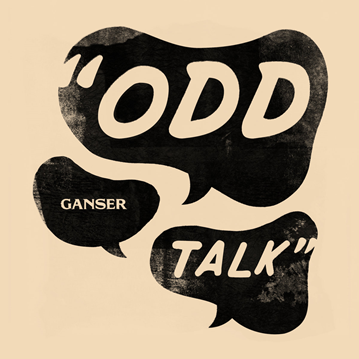
Ganser – ODD TALK
Genre: Post-Punk
Favorite Tracks: “Avoidance,” “Aubergine,” “Touch Insensitive”
One of the most defining aspects of this decade’s music has been the blurring and dissolution of genres. As each individual genre inches closer to its own singular ceiling, artists will cross the barrier into other sonic arenas to stay fresh. Ganser is emblematic of this disregard for rigid conformity to a genre.
The Chicago four-piece’s debut LP, ODD TALK, melds punk, indie rock, and shoegaze together into a surprisingly coherent collage. While there are tracks on here that sound just like you’d expect from a post-punk release (“Psy Ops,” “Yes No”), ODD TALK packs plenty of surprises into its 38-minute run time. “(Miscommunication)” is a dystopian instrumental that wouldn’t be too far out of place on an episode of TWIN PEAKS, while “Revel” opens with a melody that’s a near dead ringer for “Pure Imagination,” and frontwoman Alicia Gaines’ verses could easily be pasted onto a neo-R&B hit. Neither track is a standout in quality, but they show that Ganser isn’t afraid to experiment and offer an insight into their bright future.
ODD TALK’s two best tracks are “Aubergine” and “Touch Insensitive.” The former is perhaps the noisiest song on the album with a wall of harsh, wailing guitar feedback nestled in the back of the mix as Gaines ranges from cool, disinterested crooning to pissed off growls, while the latter is a the dreamy shoegaze closer where the vocals melt into the guitars and keys to the point where it feels like a single instrument. It’s another promising moment on a record littered with flashes of potential hits. ODD TALK is a record that doesn’t quite stand up to some of the more established rising stars of the genre (Preoccupations, Priests, Guerilla Toss), but it certainly feels like they’ll get there soon. [Ryan Moloney]
Verdict: Recommend
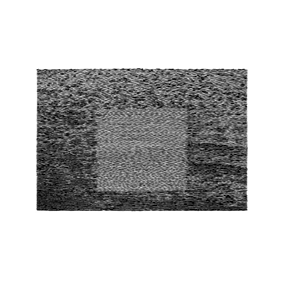
Grouper – GRID OF POINTS
Genre: Singer/Songwriter, Ambient Pop
Favorite Tracks: “The Races, “Driving,” “Blouse,” “Breathing”
It’s hard to imagine Liz Harris as anything but a disembodied spirit wandering the forest. Even her purely ambient work has sounded like something wrought up in the woods by little dead girls in gossamer gowns, just hoping to enchant any passersby. There’s no malicious intent though, they’re just lonely. Really, really lonely. GRID OF POINTS, Liz Harris’ 11th studio album as Grouper, stays firmly in the thick of these trees, continuing this remote, hushed, seraphic haunt.
As ethereal as Harris’ music is, I’ve always considered it to be less concerned with the heavens and more with those who are left behind, or those who have yet to make amends, to finish some business necessary to their celestial advancement. Even Grouper’s album covers have displayed this sort of unstable middleground; 2014’s RUINS sees a silhouette grounded yet morphing upward to an open sky, and 2008’s DRAGGING A DEAD DEER UP A HILL features a doll-like girl, not unlike the ones I described earlier, as a fey onlooker stuck between here and hereafter. GRID OF POINTS is no different, showing a square of static encased in more static. Opener, “The Races,” squarely begins this purgatorial wayfare. It’s 48 seconds of pure cavernous, sacramental vocalizing. “It smells like rain / it is raining,” Harris coos, backed by a layer of angelic harmonizing and that tape hiss that follows her everywhere she goes. Fittingly, Liz Harris’ music plays like rain, or the moment after the rain has subsided, like a ghostly vapor lingering to any vestige of air it can. This is why I always come back to her, why I rely on her: she knows how to bring the sounds of the outside in. The rest of the tracks evoke similar effects with the extra utility of her piano, which manages to expand the soundscape even more, highlighting how desolate this place really feels.
It’s hard to make out what Harris is saying a lot of the time, either due to clouded vocal harmony or just the generally whispering nature of her voice. But it in no way negates the project. I’ll stay for the spectral swaddling and the times I’m actually able to catch a line or two. All I could really ascertain on closer “Breathing” was, “last night you lay down gently . . . and then you died,” and that’s all I needed to be sufficiently shook. But Harris doesn’t stop there. To yield an even greater jolt, the track fades into a field recording of cars whirring by. It’s here where I realized we’re no longer in the shadowy marge, observing an aimless soul. We’re right next to the deathbed, window open to the street, observing . . . well, the final breathing, moments before. [Nick Funess]
Verdict: Recommend

Lord Huron – VIDE NOIR
Genre: Indie Rock
Favorite tracks: “Never Ever,” ‘Wait by the River,” “Vide Noir,” “Emerald Star”
Everyone’s favorite narrative-based folk group, Lord Huron, is back as they take on the final frontier. Unlike classic and contemporary Star Trek, VIDE NOIR deals more with interdimensional space and the invocation of being swallowed whole into a microcosmic cityscape void. Based on the pre-released singles, I could tell a change in sound was happening, and despite “Wait by the River” quickly establishing itself as one of my all time favorite Lord Huron songs, I was wary. After listening to the album, however, I think an initial armistice and eventual obsession was created. While Lord Huron posit the notion of multiple characters interacting in their own spheres such as Big Jim, Louisa, and the World Ender themself, a new perspective emerged. In VIDE NOIR, it is now the audience’s subjectivity and ambiguity of thought that plays the most integral part of the experience. All songs are unquestionably from the same album and therefore narrative, but the characters involved and where the action is taking place can be interpreted from the cosmos itself, or some disintegrating, unknown city. Despite all this new change, Lord Huron’s key themes of unrequited love, the beauty in death, and existential nihilism are not only present but, fortunately, in full swing.
As for technical quality, VIDE NOIR’s incorporation of ambient noise, bass guitar, and especially the theremin in “Emerald Star” make it feel like Lord Huron has not only gone back to their EP, and thus their roots, but experimented with the border of folk and rock ‘n roll. In a sense they’ve become self-aware, harboring the retrospections endowed by forests and desert beaches from STRANGE TRAILS and LONESOME DREAMS and repurposing them in a city on the precipice of reality and tumultuous astral planes. Not to mention their attention to detail, world building, and lyrics has become eerily perfect. To advertise and establish the album, the band created a way for only certain songs to be pre-released in different cities, that way the listener would have to drive all across the country in order to listen to the whole thing. Lord Huron never fails to incite the “vagabond” dream of aimlessly blazing the country in sight of good tunes, cool nights, and gasoline as a vessel for chasing off heartache. VIDE NOIR is not only a testament to the possibilities of experimentation, but it makes audiences, myself included, excited for their next evolution. [Jesse Herb]
Verdict: Recommend
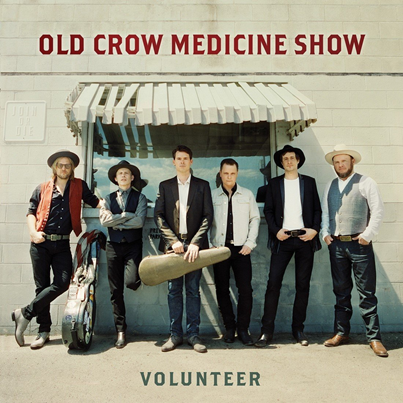
Old Crow Medicine Show – VOLUNTEER
Genre: Old-Time, Americana
Favorite Songs: “Flicker & Shine,” “Child of the Mississippi,” “Look Away,” “The Good Stuff,” “Old Hickory,” “Homecoming Party,” “Whirlwind”
VOLUNTEER transports you to the streets of Nashville with hootin’ and hollerin’ layered in almost every track. In true Old Crow Medicine Show style, the fiddle, harmonica, and banjo solos make you want to get up and dance between sips of sweet tea or mint juleps while basking in the fiery glow of a beautiful sunset. Beyond a welcomed return to their roots, VOLUNTEER is a tribute to the band’s camaraderie and the two decades they have spent creating music. Their on-the-road lifestyle would wear anyone down, with hard choices and longing for home, yet somehow they have managed to keep up the pace successfully. The album title appropriately reflects the service the band has contributed through making ingenuous, raucous live music fit into a bluegrass recording, volunteering to vagabond and play their music throughout the country and continuing to be successful. A perfect example of their great songwriting skills would be “Look Away,” which lives more on the country end with a “Truly Madly Deeply” (Savage Garden) meets “Everything I Do I Do For You” (Bryan Adams) feel. The fantastic lyrics in the verses complement the smooth chorus that is straight out of Dixie (“Cold buttermilk and honey mean more than a pocket full of money”). It’s the shining star on VOLUNTEER, despite the touching melancholic melody being more contained than what Old Crow is known for. Moreover, the album translates really well into the wild live performance we’ve come to expect of Old Crow. From the fiery opener “Flicker & Shine” through the perfectly balanced weaving of high-tempo dance jams to slower, more serious songs, through the whimsical love-ballad finale, “Whirlwind,” Nashville recording guru Dan Cobb managed to capture their street-savvy bluegrass while adding the perfect finishing touches to give VOLUNTEER a full-band sound without compromising the band’s identity. The electric guitar that has been long absent in the bands repertoire (unheard of since “Wagon Wheel”) is finally making a comeback. On the blues end of bluegrass is “Child of the Mississippi,” a song as Southern as “Sweet Home Alabama” with deep vocals and hearty banjo riffs. More often than not, bands move away from their original ethos, and after covering Dylan’s BLONDE ON BLONDE last year, they definitely had the option to change direction. Luckily, Old Crow Medicine Show know not to fix what isn’t broken. [Liliane Neubecker]
Verdict: Recommend
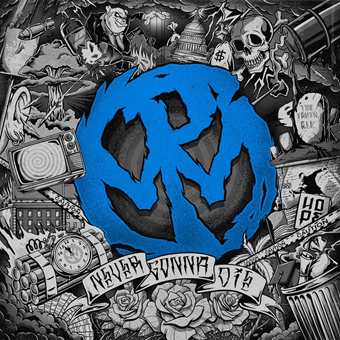
Pennywise – NEVER GONNA DIE
Genre: Skate Punk
Favorite Tracks: “All the Way U Can Die,” “Listen,” “Something New”
Even when I was a young, uncultured music listener who listened to Boys Like Girls on repeat, most pop-punk was too compromised for me to get into. Solemn balladry, adolescent bellyaching, and catchy punk anthems are best enjoyed separately from each other, and the number of bands that have balanced all three, or even just two, is slim. Pennywise have always struck me as more wholesome than most, but without enough cleverness or intensity, all their political platitudes come off as trite. It’s a five-car-pile-up of vaguely revolutionary language that gets you fired up; however, unlike Bad Religion, it doesn’t stick with you for more than five minutes after listening. About the only memorable moment on their 12th studio album, NEVER GONNA DIE, is the opening of the otherwise indistinguishable “Can’t Save You Now,” where some of Trump’s most condescending and elitist statements are played—other tracks would have benefitted from more direct references or individualized language beyond the amorphous evils of war and corruption. I’m focusing on the lyrical content because there’s not much to talk about in terms of the music: though it’s not as airbrushed as something like Blink-182’s CALIFORNIA, the stream of power chords and kinetic yet monotone drumming are nothing new. The final three songs, especially “All The Ways U Can Die,” showcase less linearity and more finesse and potency in the guitar work, which I would have loved to see more of. Nonetheless, I have tons of respect for any perennial punk, even if NEVER GONNA DIE has no chance of converting the unconverted or appealing to anyone outside their devoted fanbase. [Blake Michelle]
Verdict: Do Not Recommend
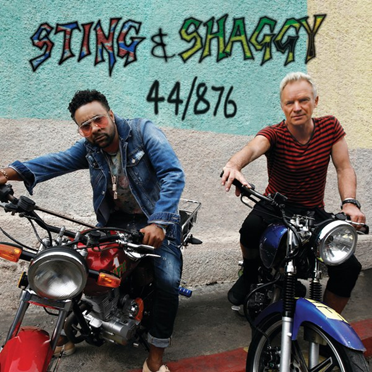
Sting & Shaggy – 44/876
Genre: Reggae
Favorite Tracks: “Morning is Coming,” “To Love and Be Loved,” “Night Shift”
Since their debut as a fabulously average bromance at this year’s Grammy awards, Sting & Shaggy have been pushing their joint venture 44/876, a contemporary reggae jam sesh that offers everything your 50+ year old dad needs. After all, it is a merge of the sexy Englishman your father used to rock out to in the early ‘80s and the comically confusing dancehall rapper that made him feel young again in the early 2000s. Keeping that in mind, this collaboration should not be as unanticipated as it seems. It is no secret that most of Sting’s career, both as frontman of The Police and as a solo act, is based off of fusing the sounds of the Caribbean with poppy classic rock. By doing so, he has created an identity in both genres that allows him to traverse between the two seamlessly. On the flip side, Shaggy has presented an array of bombastic (or should we say boombastic) jams that do their fair share of genre mixing between raggamuffin, dancehall, and hip hop.
On 44/876, we are treated to diverse mix of instrumentation that ranges from the steel drum to the full-blown brass on “If You Can’t Find Love,” reminiscent of a chamber orchestra introducing Her Majesty the Queen. The peak amalgamation of the duo can be found on “Morning is Coming,” a cheery lullaby in the context of the album that perfectly blends Sting’s soft demeanor with the delightful simplicity of Shaggy’s lyricism. Tracks in the vein of “To Love or Be Loved” are quintessential Shaggy tunes that transport you to sandy beaches and turquoise waters, while romps like “Night Shift” stay on brand even though the messaging bares more weight.
But, 44/876 comes to us at a bizarre time. The breezy vibes of “Just One Lifetime” and “Don’t Make Me Wait” slowly creep into a slew of political themed tracks that provide several moments that feel awkward given the tensions of today. On “Dreaming in the USA,” the duo channels their inner Springsteen while putting their migrant plights on display. The track ultimately serves as a recollection of their struggles and a thank you to the freedoms of America. Yet their take on the American Dream is a hard one to pitch under the current administration. Still, the project is an honest try to do something different in a landscape where it stands no chance, and while it feels mostly silly in its entirety, I loved every moment of it. [Michael Stanziale]
Verdict: Recommend

